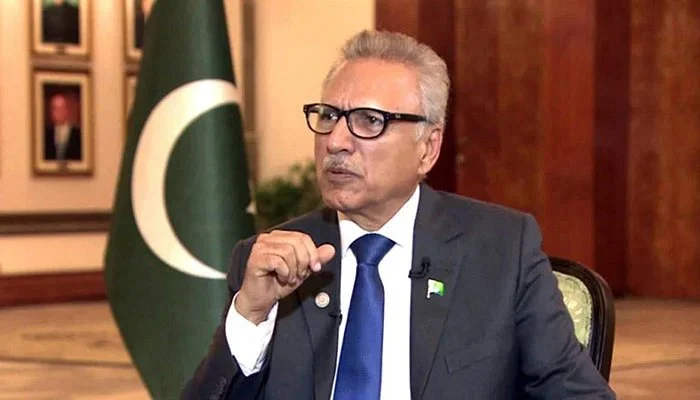- President Arif Alvi contests that Article 46 was violated.
- President returns bills for “reconsideration and detailed deliberation”.
- Bills passed “in haste and without due diligence”, he says.
ISLAMABAD: President Dr Arif Alvi on Saturday refused to sign the bills seeking amendments in the NAB and election laws, and returned them back to Prime Minister Shehbaz Sharif as he “was not informed” about the “legislative proposal” under Article 46 before they were tabled in Parliament.
The National Assembly had last week passed bills to abolish the PTI government’s election reforms giving overseas Pakistanis the right to vote through i-Voting and electronic voting machines (EVMs), as well as the NAB laws.
After the president’s refusal to sign the bills, the federal government has decided to convene a joint sitting of the Parliament to pass them, sources told Geo News.
Meanwhile, a press release issued by the president’s office said that Dr Alvi returned the National Accountability (Amendment) Bill, 2022 and Elections (Amendment) Bill, 2022 for “reconsideration and detailed deliberation” to Parliament and its committees under Clause (1) (b) of Article 75.
The president has contested that Article 46 was violated as he was not informed about the legislative proposals before they were brought before the Parliament. Article 46 states that “the prime minister shall keep the president informed……. on all legislative proposals the federal government intends to bring before Majlis-e-Shoora (Parliament)”.
Dr Alvi also noted that the bills were passed “in haste and without due diligence”. He noted that both the bills have “far-reaching impact on society” and should have been discussed in detail.
NAB amendment changes burden of proof: president
On NAB laws, President Alvi noted that the amendment shifts the burden of proof on the persecution and would make the accountability watch dog’s laws similar to the code of criminal procedure.
“This will make it impossible for the prosecution to prove cases of corruption and misuse of official authority by the state persons and will bury the process of accountability in Pakistan,” claimed Dr Alvi. He also noted that the amendment is “against the spirit of Islamic jurisprudence”.
“This amendment would make the tracing money trail for the acquisition of illegal assets almost impossible especially when the records of the property/assets/wealth are neither digitised nor can be traced especially in benami properties by the investigators,” said the president.
Dr Alvi is of the view that if the amendments are enacted then the “ongoing mega corruption cases” in courts will become “infructuous”.
“Therefore, the proposed amendment which should have strengthened the accountability mechanism to eliminate corruption and political engineering to ensure good governance in the country has been rendered a toothless entity,” concluded the president.
Overseas Pakistanis deprived of voting rights since 1990s: President Alvi
On the election amendment bill, Dr Alvi noted that overseas Pakistanis have been deprived of voting rights despite commitments made to them by different prime ministers and presidents during their overseas trips since the 1990s.
“As a result of constant pursuance by them, the Supreme Court of Pakistan in 2018 upheld its earlier decision of 2014 on the voting rights of overseas Pakistanis and reiterated that with improving technology, efforts should be made to allow them to vote from outside of Pakistan,” said the president.
The president also shared that the Supreme Court had expressed its regret about the system not being used despite its judgment in 2014.
“Objections on the possibility of hacking the I-voting have no ground as the amount of digital financial transactions taking place are to the tune of approximately $5 trillion daily which has been increasing to almost $8.5 trillion every day. The probability of a plane crash is thousands of times higher than the probability of hacking of a digital transaction today,” said the president.
The president stated that the process used to ensure secure digital payments can “ensure anonymity and security of the vote and can also be subjected to complete audit on the truth-match of the vote cast”.
“The EVM to be adopted by Pakistan is unique and combines a paper system of votes as we already practice, together with an electronic counting to keep a permanent supportive safety record. The legislature can always make laws that in case of discrepancy or dispute, the paper count rather than the electronic count will take priority or vice versa. There is no risk involved,” he said.
“In Pakistan, the stigma of rigging is attached to every election resulting in that every government has to bear an allegation of non-representation, reducing its credibility in some segment of the population within the country thus weakening it, and also with implications internationally. Billions are lost in litigation and confrontation”, the President added.
He observed that the new amendments in this form are like taking one step forward, and then panicking and taking two steps backwards. Changing them back is tantamount to unnecessarily delaying these technical processes for the advancement and transparency of elections in Pakistan.
He recommended that Parliament should not regress on these laws, in fact only improve them with set timelines to ensure implementation.

